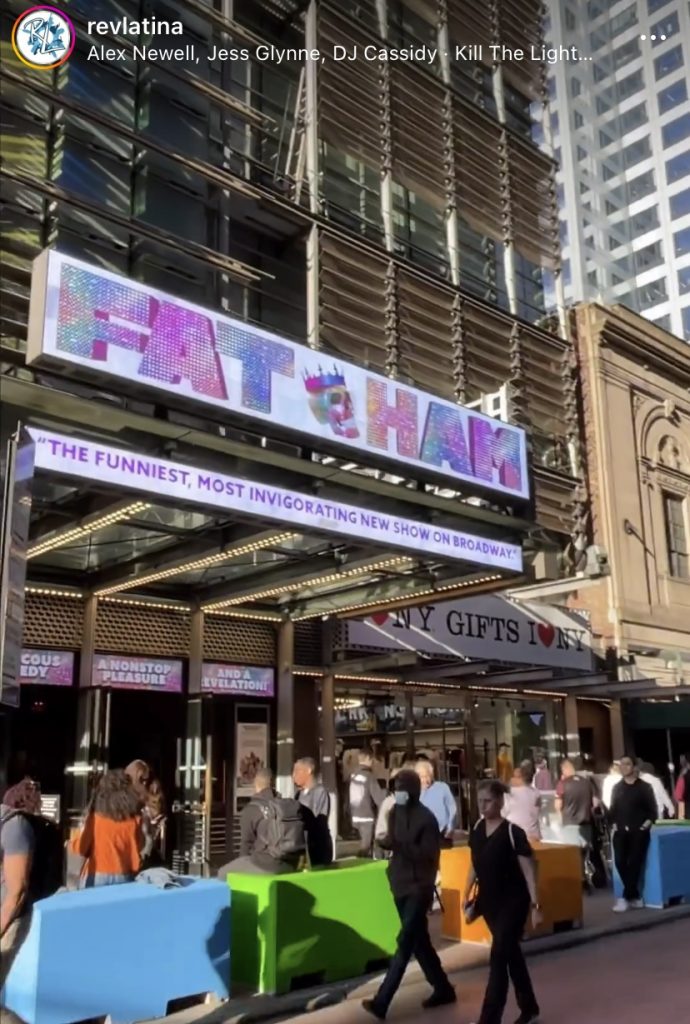By: Maria Belisario
 It is a challenge to instill the Shakespeare genre to the newer and younger minds of today, but Fat Ham has done just that. This 500-year-old story is turned upside down in a jam-packed 95-minute show, with no intermission! There were many moments where I laughed my butt off, where my heart warmed up like the grill onstage, and where I was dancing to the music. I had no prior knowledge of what this show entailed other than my peers’ rave reviews. But this play is a clear standout this Broadway season and deserves to be seen worldwide. It had the family tensions audiences can relate to and the fabulous spectacles audiences can escape in. Hint, the last scene was a flamboyant, sparkly dance party.
It is a challenge to instill the Shakespeare genre to the newer and younger minds of today, but Fat Ham has done just that. This 500-year-old story is turned upside down in a jam-packed 95-minute show, with no intermission! There were many moments where I laughed my butt off, where my heart warmed up like the grill onstage, and where I was dancing to the music. I had no prior knowledge of what this show entailed other than my peers’ rave reviews. But this play is a clear standout this Broadway season and deserves to be seen worldwide. It had the family tensions audiences can relate to and the fabulous spectacles audiences can escape in. Hint, the last scene was a flamboyant, sparkly dance party.
Unlike any Shakespeare piece I have seen, the creative direction revamps Hamlet into a comedy rather than following its tragic roots. I love how they don’t hyperfocus on the heightened text, taking a modern, loser approach to language. Instead, they borrow some speeches and lines, perhaps the most important ones, and sprinkle them throughout the script. Many productions stay strict to the text, hyper-focusing on Hamlet’s melancholy and how his grief transforms into revenge. Fat Ham, as tragic as it is to see Juicy be treated horribly by his new “father”, is reinvented as a comedy. He knows who he is deep down, but is unsure how he fits in with this new family structure that is very uncomfortable.

This show tackles the idea of belonging and identity. How do I belong if my identity is different from what my family values? I believe there is a case for every character in this world where belonging was something they struggled with, even if it was with one person or a crowd. But specifically with the younger generation, Juicy and Opal cope with their struggle with belonging in different ways anyone can connect with. They grapple with their LGTBQ+ identities as their parent’s generation aren’t as accepting and open. There is no sense of community within their family. Isn’t that we want? To belong in a community? But what is different between the parents’ generations and the younger generation is the definition of belonging in a community. A dated definition of community ties with the idea of homogeneousness, but this show exhibits that today, that is not the case.

Our differences should not stop us from belonging in a community, they should empower us to be who we are unapologetically. We must accept and lift each other’s differences rather than villainize them. Tio’s character is the best friend/cousin we all need, because he never apologizes for who he is but at the same time never pushes Juicy to be or do anything. In the original Hamlet, he immediately dies after killing his uncle, Claudius. Juicy contemplates killing his uncle but falls for Larry, a serious, accomplished soldier who ignores who is in order to belong. Instead of being vengeful and acting from a place of hate, Juicy helps Larry break out of his shell to become a queer, glittery icon. What an ending! And what a beautiful message.
A stage full of diverse bodies spreading love, because that is what prolongs our humanity and the communities we create. I always wonder why Shakespeare has continuously been told for half a century. Its renewed existence has consistently exposed our humanity generation by generation, era by era, and human by human.
Maria Belisario was part of RL’s Theater Trip. This theater experience was possible thanks to our partnership with The Harriet Tubman Effect Institute.

